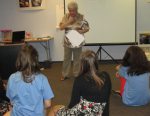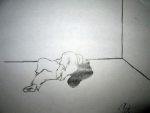News

Amnesty International: Separatist forces in Ukraine accused of threatening mass ‘executions’
The armed group calling itself the Donetsk People’s Republic (DPR) must not carry out 'executions', including a reported threat of killing prisoners facing life sentences, Amnesty International said on August 22. Czytaj więcej…

Nino Katamadze considers death penalty an important negative point in Belarus
The world-known Georgian jazz-rock singer, leader of the band “Inside” told it tut.by while speaking about her likes and dislikes in Belarus. Czytaj więcej…

Death convict’s mother receives son’s belongings
On August 20, Tamara Sialiun, mother of death convict Pavel Sialiun, who was executed in April for a double murder, picked up her dead son’s things at the Hrodna Regional Court. There, she was given a few dozen tapes, CDs, LPs, mobile phones and other items that belonged to Pavel. Czytaj więcej…

Berlin students: Young Belarusians have to fight for their rights and not to lose hope (photos)
Three students of the Free University of Berlin, one of Germany’s largest universities, came to Vilnius to meet with the participants of the Summer Human Rights School, as well as with students from the Vilnius-based European Humanities University. Elena Gettsel, Satik Agekyan and Elena Pulich chose Belarus as the subject of their research at the Institute for East European Studies, which, according to them, is a rare option. Meanwhile, this choice was suggested by a circumstance that impressed them so much – until today the Belarusian state punishes its people with death, disregarding the right to life. During their meeting with the Belarusian youth, the issue of the death penalty was in the center of the discussion of the problems of human rights in Belarus. Czytaj więcej…

Dominican walls: last resting place before execution
The death penalty becomes widespread during suppressing of uprisings and revolutions. So it was during the uprising under the leadership of Kastus Kalinouski when Russian courts sentenced 128 rebels to death, and the Governor-General of the North-Western Territory (present-day Belarus) Mikhail Muravyov was nicknamed “hangman”. The rebels were executed by a firing squad or by hanging, according to a special law. Czytaj więcej…

Tamara Chikunova: «I want Lukashenka to know that the blood of the people killed under the law is on his hands»
The founder of the Uzbek organization "Mothers against the Death Penalty and Torture," Tamara Chikunova closely cooperates with the Belarusian human rights activists because she considers the abolition of the death penalty throughout the post-Soviet region to be one of her main tasks. Czytaj więcej…

Aliaksandr Hrunou visited bylawyer on death row
Human rights defenders continue to monitor the situation of the Homel resident Aliaksandr Hrunou, sentenced to death. Since the Supreme Court Chairman, Valiantsin Sukala personally dismissed the review appeal of his lawyer, the death sentence can be implemented at any time. Czytaj więcej…

Discussion on use of death penalty in Belarus held in Vilnius
The death penalty is irreversible, the miscarriage of justice in the case of the death penalty can not be corrected. This was told to the students of the human rights school in Vilnius by Tamara Chikunova - well-known human rights activist, founder of the organization "Mothers Against the Death Penalty and Torture." Czytaj więcej…

Death penalty: “prison drawings” inspired by executor's narration (video)
How is a shooting done? This is known only to the victims and executioners. However, the former ones won't tell anyone about it. Czytaj więcej…

Ales Dashchynski: the may have supported the abolition of the death penalty, though he couldn't say it openly
How was the topic of the death penalty covered in Belarus more than 15 years ago? One of the first extensive articles appeared in the independent Belarusian newspaper "Svaboda" February 17, 1998, when its editor was Ihar Hermianchuk. The article was placed in the "Topic" column and was titled "Death Penalty". Czytaj więcej…

‘Death penalty has no place in 21st century,’ declares UN chief
2 July 2014 – The death penalty has no place in the 21st century, United Nations Secretary-General Ban Ki-moon declared today, calling on all States take concrete steps towards abolishing or no longer practicing this form of punishment. Czytaj więcej…

Abolition of the death penalty. How can journalists help?
Palina Stsepanenka, a writer and an activist of the campaign “Human Rights Defenders against the Death Penalty”, tells about the issue of the death penalty and the “place for the press” in an interview for Radio Racyja. Czytaj więcej…

Valiantsin Stefanovich: “In 1996, when a referendum was held, there was no life imprisonment in Belarus”
Why does Belarus retain such a means of punishment as the death penalty? Deputy Chairman of the Human Rights Center “Viasna” Valiantsin Stefanovich believes that the cause must be sought in the Soviet past. In the USSR, the death penalty was used for a wide range of crimes. Czytaj więcej…

The Last Dawn: Belarusian musicians against the death penalty (video)
The Minsk-based Graffiti club hosted yesterday the presentation of the project of Belarusian musicians called Aposhni Zolak (“The Last Dawn”). In this way, a number of famous musicians, among them Hanna Khitryk, Aliaksandr Pamidorau, Zmitser Vaitsiushkevich, Anastasia Shpakouskaya, Viktar Rudenka, Liavon Volski, spoke against the death penalty. Last year they had a big concert in Bialystok, and Belarusian fans were able to watch it online. Czytaj więcej…

Live to see The Last Dawn: Audio and video presentation!
Aposhni Zolak (“The Last Dawn”) continues the traditions of such musical projects as “Narodnya Albom” ("The People's album ") “Ya Naradziuskia Tut” ("I Was Born Here") and “Sviaty Vechar” ("Holy Night"). However, the project is devoted to a very sensitive and vital issue – the death penalty. Czytaj więcej…

